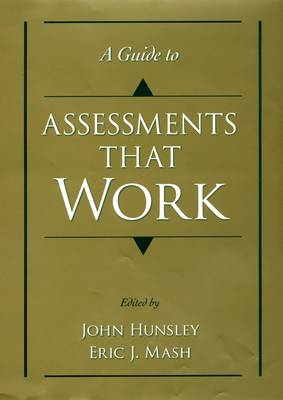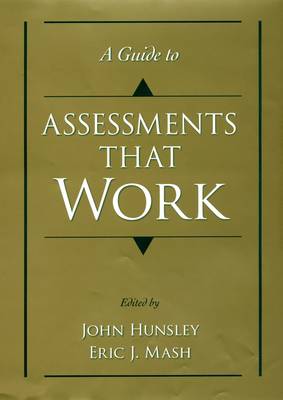
- Retrait gratuit dans votre magasin Club
- 7.000.000 titres dans notre catalogue
- Payer en toute sécurité
- Toujours un magasin près de chez vous
- Retrait gratuit dans votre magasin Club
- 7.000.0000 titres dans notre catalogue
- Payer en toute sécurité
- Toujours un magasin près de chez vous
Description
The need for evidence-based practice in mental health services is becoming clearer by the day and, until recently, the trend of emphasizing services with supporting empirical evidence has been almost exclusively limited to a focus on treatment options. A Guide to Assessments That Work fills a void in the professional literature by addressing the critical role that assessment plays in providing evidence-based mental health services. To optimize its usefulness to readers, this volume addresses the assessment of the most commonly encountered disorders or conditions among children, adolescents, adults, older adults, and couples. Strategies and instruments for assessing mood disorders, anxiety disorders, couple distress and sexual problems, health-related problems, and many other conditions are also covered in depth. With a focus throughout on assessment instruments that are feasible, psychometrically sound, and useful for typical clinical requirements, a rating system has been designed to provide evaluations of a measure's norms, reliability, validity, and clinical utility. Standardized tables summarize this information in each chapter, providing essential information on the most scientifically sound tools available for a range of assessment needs. Using the tools provided in A Guide to Assessments That Work, readers can at a glance determine the possible suitability and value of each instrument for their own clinical purposes. This much needed resource equips readers with the knowledge necessary for conducting the best evidence-based mental health assessments currently possible.
Spécifications
Parties prenantes
- Auteur(s) :
- Editeur:
Contenu
- Nombre de pages :
- 676
- Langue:
- Anglais
- Collection :
Caractéristiques
- EAN:
- 9780195310641
- Date de parution :
- 01-03-08
- Format:
- Livre relié
- Format numérique:
- Genaaid
- Dimensions :
- 188 mm x 254 mm
- Poids :
- 1360 g

Les avis
Nous publions uniquement les avis qui respectent les conditions requises. Consultez nos conditions pour les avis.






